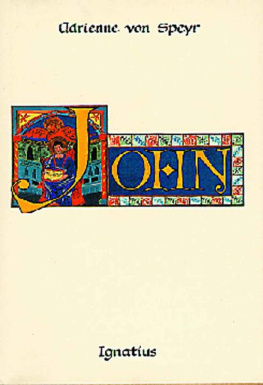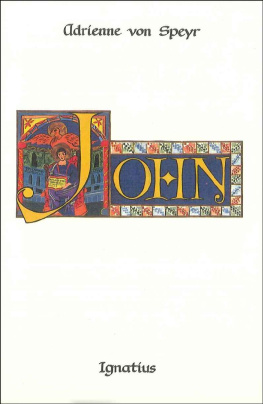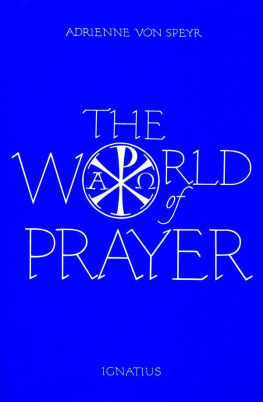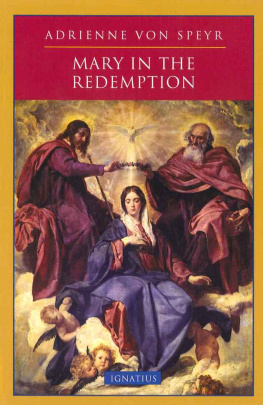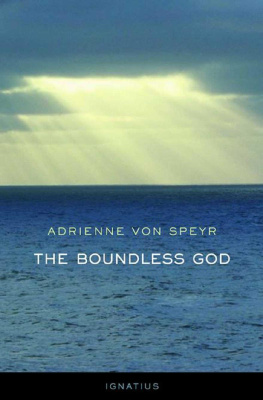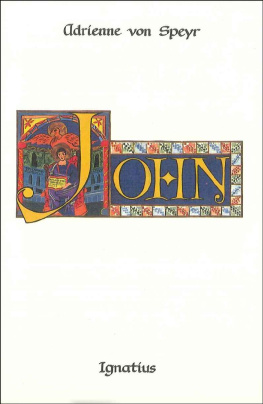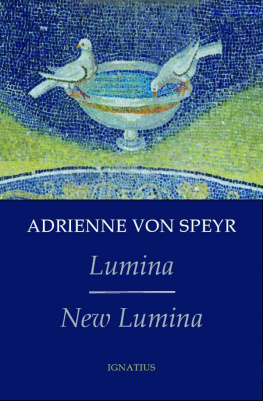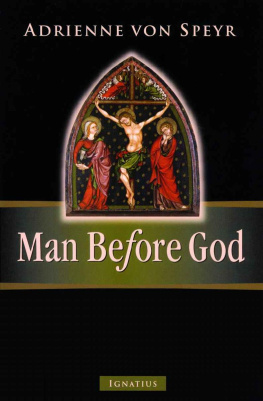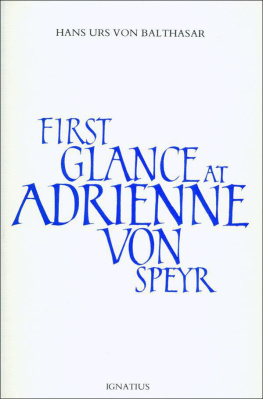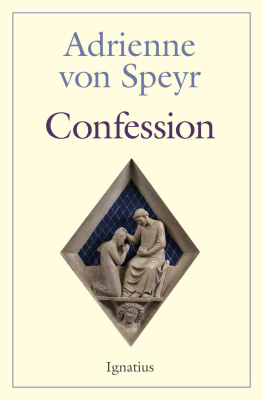Adrienne von Speyr - Elijah
Here you can read online Adrienne von Speyr - Elijah full text of the book (entire story) in english for free. Download pdf and epub, get meaning, cover and reviews about this ebook. year: 1993, publisher: Ignatius Press, genre: Religion. Description of the work, (preface) as well as reviews are available. Best literature library LitArk.com created for fans of good reading and offers a wide selection of genres:
Romance novel
Science fiction
Adventure
Detective
Science
History
Home and family
Prose
Art
Politics
Computer
Non-fiction
Religion
Business
Children
Humor
Choose a favorite category and find really read worthwhile books. Enjoy immersion in the world of imagination, feel the emotions of the characters or learn something new for yourself, make an fascinating discovery.
- Book:Elijah
- Author:
- Publisher:Ignatius Press
- Genre:
- Year:1993
- Rating:4 / 5
- Favourites:Add to favourites
- Your mark:
- 80
- 1
- 2
- 3
- 4
- 5
Elijah: summary, description and annotation
We offer to read an annotation, description, summary or preface (depends on what the author of the book "Elijah" wrote himself). If you haven't found the necessary information about the book — write in the comments, we will try to find it.
Elijah — read online for free the complete book (whole text) full work
Below is the text of the book, divided by pages. System saving the place of the last page read, allows you to conveniently read the book "Elijah" online for free, without having to search again every time where you left off. Put a bookmark, and you can go to the page where you finished reading at any time.
Font size:
Interval:
Bookmark:
ADRIENNE VON SPEYR
Elijah
ADRIENNE VON SPEYR
Translated by
Brian McNeil, C.R.V .
IGNATIUS PRESS SAN FRANCISCO
Title of the German original: Elija
1972 Johannes Verlag, Einsiedeln
The Bible text in this publication is from
the Revised Standard Version
of the Bible 1946, 1952, 1971,
by the division of Christian Education of the
National Council of Churches of Christ in the U.S.A.
and is used by permission.
Cover by Victoria Hoke Lane
1990 Ignatius Press, San Francisco
All rights reserved
ISBN 978-0-89870-270-5
Library of Congress catalogue number 89-83352
Printed in the United States of America
THE DROUGHT IS ANNOUNCED
1 Kings 17:1. Now Elijah the Tishbite, of Tishbe in Gilead, said to Ahab, As the Lord the God of Israel lives, before whom I stand, there shall be neither dew nor rain these years, except by my word.
Elijah presents himself with two words that are a unity for him: truth and service. So truly as Yahweh lives , and Yahweh is Israels God . Truth belongs to God but has become an obligation for Elijah: he must devote his life to the truth, must put himself at the service of a truth that knows neither beginning nor end. The servant steps forth from this truth as an individual form that points to the truth of bis God, that is, to the eternal truth. At the same time, he serves his God; one can picture to oneself this service as limited by the length of life of the servant, but also quite simply as a service that God has chosen for the servant of his truth and whom he therefore uses eternally. Elijah will no more cease to serve God than God will cease to be true.
And when the servant now begins to utter threats in the name of his God, who has the sovereignty over rain and dew , this happens in a mission that he does not explain for a long time. He does his duty. He must. So strong is this obligation that he does not need to excuse himself in any way or to refer to any special command of God or to any proofs of favor that God has shown him. For he stands at the point where truth and service are one to such a degree that he can bear witness to this both through his being and through his words.
Christ will be the Word of the Father, and his word will always include and disclose the action that he does. Thus he will widen the sphere of his Father upon earth and glorify the Triune God, Elijah must take another path. He must embody the power of God: his omnipotence, his omniscience. At the same time, he must embody the mission, in a sense that is always concrete and new. It is important that the rain and dew cease and come back only at Elijahs word, for this shows that God gives his own power into the hand of the man whom he sends. When the man uses this power, he bears witness both to the power of God and to his own commission. A man in his commission becomes an absolute value, a measure of judgment.
Taken as a whole, Elijahs public life is one single act of being there . The truth of God and its permanenceand the prophet and his ministryboth together make up what is and what is given: given to those who live in sin and have forgotten God. They are shown man in his purity, his power, and the punishment that is meted out in this power. The glory of God stands, as it were, in the background, for if Elijah were to speak only of God and his greatness, the sinners would not listen to him. The approach road to God is closed by the sin that blocks the understanding and makes love impossible.
The dialogue begins abruptly: it seems to be a mere conversation between men, without solemnity and ceremonial. The word of God that the Son will speak will be introduced by the Annunciation, the three kings, the presentation in the Temple, and so on. He will appear with an authority in which at every moment something of the glory of the Father will be visible. Here, two ordinary men speak with one another: one under the impulsion of a commission from the truth to one who is a liar, one who is pure to one who is a sinner. God needs Elijah as a man, and he gives him the power to speak and to act in the name of God, but within the sphere where only sinners are to be found: in punishment.
Elijah, equipped with this divine power, seems to be a superman: the stature of this man has grown all out of proportion, so that it no longer fits what sin has made out of man. The sinners no longer know what man in truth is or that his relationship to God can be so strong; they have forgotten that man has been created to be the image of God. In this ignorance, they can no longer understand the words of the prophet. They can repeat them: So truly as God lives..., and they can relate what Elijah does in his service, but this does not teach them anything more about service and truth. It is only when punishment is inflicted on them that they open their ears. It is obvious to them that they need dew and rain, and gradually the fact that these continue to be lacking lets the sinners see something of the prophets service and of Gods truth. The God to whom they have drawn near, the God whom they will meet because he meets them, is a punishing God.
Elijah has power in his hand: except by my word . The first point is certain: it will not rain. The second is possible, for a door of hope opens in the midst of the inexorability: except... The prophet embodies both the power and the hope. The hope will become the hope of the sinners, too, later on, when they have come to the end because the drought lasts too long. Then they will begin to hope that he will speak the word. For Elijah, hope is an integral aspect of truth and service. He shows them that this except lies in his power, but he does not tell them when and how the possibility will be realized. That is his secret, which he reserves to himself in the very act of disclosing the truth of God, in whose service he is. Thus they can comprehend that as soon as they admit that this God is true, as soon as they return to his service, the mystery that enfolds Elijah will be revealed to them. The prophecy has one starting point, God, and one finishing point, Elijah and his word. But they cannot have Elijah by himself; one cannot address him in human terms in order to soften him, because everything depends on the first words he says: as the Lord the God of Israel lives . Israel can come to an understanding with Elijah on the basis of faithnot by means of a compromise, therefore, but only in the God who becomes visible on the basis of faith. Elijah, with his mystery, is a function of the divine truth.
This indicates in advance a whole path for the one who hears: a path, however, along which man must accept a service, a gift of self, a faith. And this paththe proclamation of the punishment, the experience of the drought, repentanceis the path of Elijah, and it is a path that can be taken despite the mystery that surrounds Elijah, despite the power that allows him to give commands over matters that are reserved to God. This path is not described as wholly impossible: it is shown and opened up as a path.
The prophecy is at one and the same time Gods statement through Elijah and a reply of the prophet to God. In this answer, God sees that the prophet has understood his task, that he knows about the power entrusted to him and makes use of it. And the sinners recognize that this power is in a relationship to the truth of God. It will become obvious that Elijah speaks truly; every day will show more and more clearly that he gives commands out of a power that he genuinely possesses, although it will never be possible for the nonbelievers to understand how God, the God of Israel, not only permits but also indeed orders an individual man to issue demands.
BY THE BROOK CHERITH
17:2-3. And the word of the Lord came to him, Depart from here and turn eastward, and hide yourself by the brook Cherith, that is east of the Jordan.
Next pageFont size:
Interval:
Bookmark:
Similar books «Elijah»
Look at similar books to Elijah. We have selected literature similar in name and meaning in the hope of providing readers with more options to find new, interesting, not yet read works.
Discussion, reviews of the book Elijah and just readers' own opinions. Leave your comments, write what you think about the work, its meaning or the main characters. Specify what exactly you liked and what you didn't like, and why you think so.


